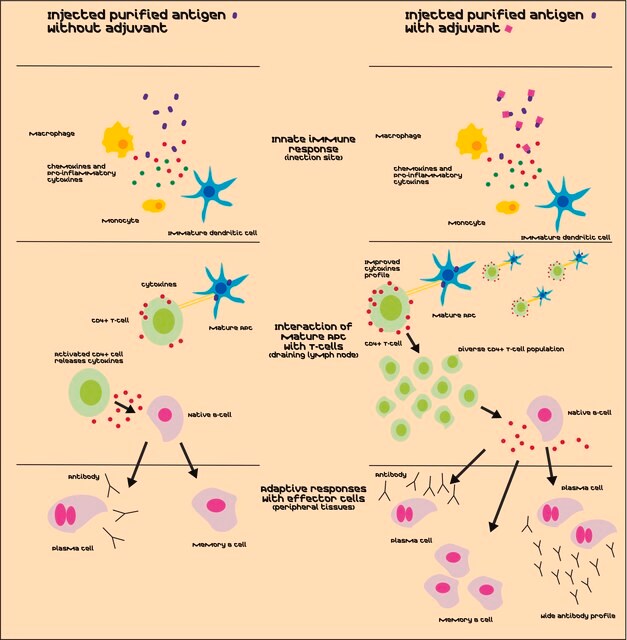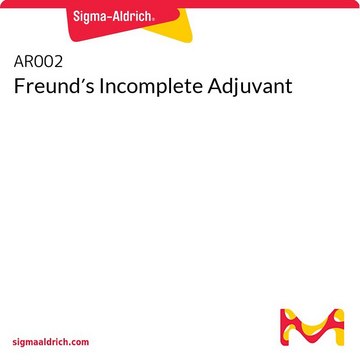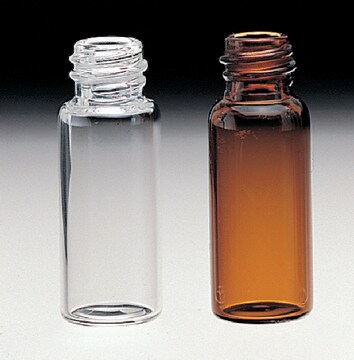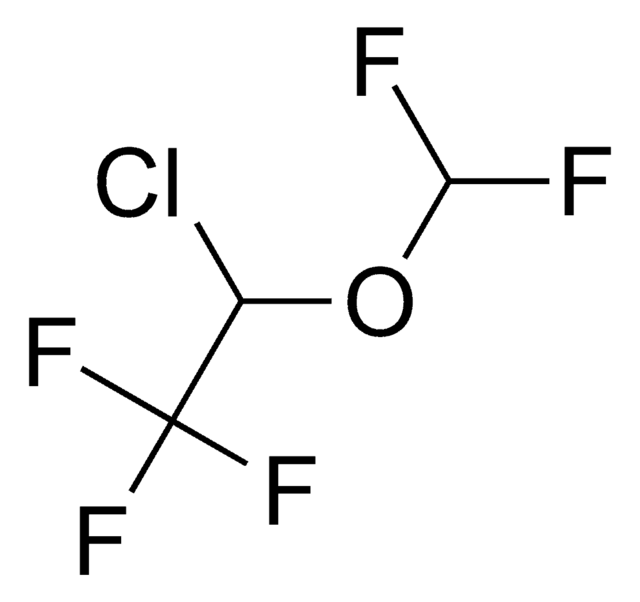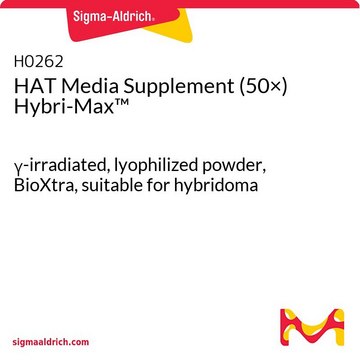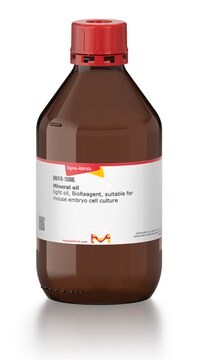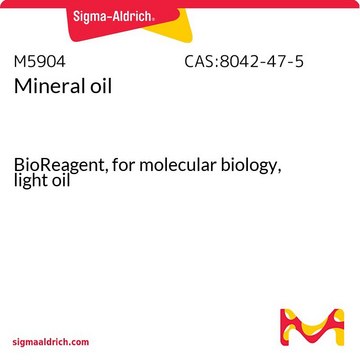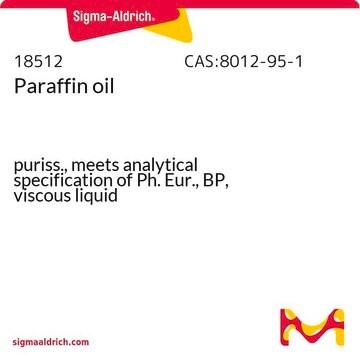344291
Freund′s Incomplete Adjuvant, Modified
Freund’s Incomplete Adjuvant, Modified Contains 85% Drakeol 5NF, 15% Arlacel A. Heat sterilized. Contains zero colony forming units.
Synonym(e):
Incomplete Freund′s Adjuvant
Anmeldenzur Ansicht organisationsspezifischer und vertraglich vereinbarter Preise
Alle Fotos(1)
About This Item
UNSPSC-Code:
41116133
NACRES:
NA.41
Empfohlene Produkte
Qualitätsniveau
Form
liquid (oily)
Hersteller/Markenname
Calbiochem®
Lagerbedingungen
OK to freeze
Farbe
yellow
Versandbedingung
ambient
Lagertemp.
10-30°C
Allgemeine Beschreibung
Contains 85% Drakeol 5NF, 15% Arlacel A (mannide monooleate emulsifier). Heat sterilized. Contains zero colony forming units/ml.
The word "adjuvant" is derived from the Latin, adjuvare, meaning "to help." During immunization, an adjuvant is generally mixed with the antigen to enhance the rate and amount of antibody formed. The most popular complete adjuvant is that of Freund. It consists of killed and dried microbial cells suspended in an emulsifying oil. Adjuvant without the microbial cells is called "incomplete adjuvant." Complete adjuvant forms a stable water-in-oil emulsion with aqueous solution of antigen. When injected subcutaneously into animals, the emulsified antigen forms a depot from which antigen is delivered slowly and at sustained levels to the animal′s antibody-synthesizing system. The induced antibody response is usually high and sustained. In guinea pigs, an additional benefit from adjuvant is the delayed appearance of hypersensitivity.
Komponenten
10 ml of Freund′s Incomplete Adjuvant homogenized in the following amounts by weight:
85% Drakeol 5 NF (light mineral oil)
15% Arlacel A, mannide monooleate emulsifier
85% Drakeol 5 NF (light mineral oil)
15% Arlacel A, mannide monooleate emulsifier
Warnhinweis
Toxicity: Standard Handling (A)
Angaben zur Herstellung
1. Take the vial of Friend′s Incomplete Adjuvant and fold the aluminum seal back to permit free access to the stopper. Be careful not to break the aluminum ring that holds the stopper in place.
2. Dissolve 50 mg of antigen in 5 ml sterile PBS, pH 7.0-7.3. Maintain or create sterility if at all feasible.
3. Draw the solution into a 10 ml syringe with a 1 inch 21 gauge needle.
4. Insert needle into adjuvant vial and forcibly drive solution into the vial. Withdraw about half the mixture into syringe and force it into the adjuvant vial again.
5. Repeat the mixing procedure in step 4 until a smooth, stable, milky, water-in-oil emulsion forms. Check if the emulsion is complete by expelling a drop from the syringe onto the water surface in a beaker. If the drop remains on the surface and does not disperse when the beaker is agitated slightly, the emulsion is adequate. A properly prepared emulsion is stable for days.
2. Dissolve 50 mg of antigen in 5 ml sterile PBS, pH 7.0-7.3. Maintain or create sterility if at all feasible.
3. Draw the solution into a 10 ml syringe with a 1 inch 21 gauge needle.
4. Insert needle into adjuvant vial and forcibly drive solution into the vial. Withdraw about half the mixture into syringe and force it into the adjuvant vial again.
5. Repeat the mixing procedure in step 4 until a smooth, stable, milky, water-in-oil emulsion forms. Check if the emulsion is complete by expelling a drop from the syringe onto the water surface in a beaker. If the drop remains on the surface and does not disperse when the beaker is agitated slightly, the emulsion is adequate. A properly prepared emulsion is stable for days.
Sonstige Hinweise
10 ml of Freund′s Incomplete Adjuvant homogenized in the following amounts by weight:
85% Drakeol 5 NF (light mineral oil)
15% Arlacel A, mannide monooleate emulsifier.
1. Take the vial of Friend′s Incomplete Adjuvant and fold the aluminum seal back to permit free access to the stopper. Be careful not to break the aluminum ring that holds the stopper in place.
2. Dissolve 50 mg of antigen in 5.0 ml of sterile PBS, pH 7.0-7.3. Maintain or create sterility if at all feasible.
3. Draw the solution into a 10 ml syringe with a 1 inch 21 gauge needle.
4. Insert needle into adjuvant vial and forcibly drive solution into the vial. Withdraw about half the mixture into syringe and force it into the adjuvant vial again.
5. Repeat the mixing procedure in step 4 until a smooth, stable, milky, water-in-oil emulsion forms. Check if the emulsion is complete by expelling a drop from the syringe onto the water surface in a beaker. If the drop remains on the surface and does not disperse when the beaker is agitated slightly, the emulsion is adequate. A properly prepared emulsion is stable for days.
85% Drakeol 5 NF (light mineral oil)
15% Arlacel A, mannide monooleate emulsifier.
1. Take the vial of Friend′s Incomplete Adjuvant and fold the aluminum seal back to permit free access to the stopper. Be careful not to break the aluminum ring that holds the stopper in place.
2. Dissolve 50 mg of antigen in 5.0 ml of sterile PBS, pH 7.0-7.3. Maintain or create sterility if at all feasible.
3. Draw the solution into a 10 ml syringe with a 1 inch 21 gauge needle.
4. Insert needle into adjuvant vial and forcibly drive solution into the vial. Withdraw about half the mixture into syringe and force it into the adjuvant vial again.
5. Repeat the mixing procedure in step 4 until a smooth, stable, milky, water-in-oil emulsion forms. Check if the emulsion is complete by expelling a drop from the syringe onto the water surface in a beaker. If the drop remains on the surface and does not disperse when the beaker is agitated slightly, the emulsion is adequate. A properly prepared emulsion is stable for days.
Freund, J. 1947. Ann. Rev. Microbiol.1, 291.
Rechtliche Hinweise
CALBIOCHEM is a registered trademark of Merck KGaA, Darmstadt, Germany
Lagerklassenschlüssel
10 - Combustible liquids
WGK
WGK 3
Analysenzertifikate (COA)
Suchen Sie nach Analysenzertifikate (COA), indem Sie die Lot-/Chargennummer des Produkts eingeben. Lot- und Chargennummern sind auf dem Produktetikett hinter den Wörtern ‘Lot’ oder ‘Batch’ (Lot oder Charge) zu finden.
Besitzen Sie dieses Produkt bereits?
In der Dokumentenbibliothek finden Sie die Dokumentation zu den Produkten, die Sie kürzlich erworben haben.
Kunden haben sich ebenfalls angesehen
Unser Team von Wissenschaftlern verfügt über Erfahrung in allen Forschungsbereichen einschließlich Life Science, Materialwissenschaften, chemischer Synthese, Chromatographie, Analytik und vielen mehr..
Setzen Sie sich mit dem technischen Dienst in Verbindung.
